Leadership Report: Evaluation of Leadership Styles and Models at Dedeman
VerifiedAdded on 2023/06/18
|11
|2683
|404
AI Summary
This report evaluates leadership styles and models at Dedeman, a Romanian hypermarket company. It assesses the impact of leadership on organizational culture and diversity management. The report also discusses the theories and practices of motivation and the role of cultural change in supporting personal characteristics within working teams.
Contribute Materials
Your contribution can guide someone’s learning journey. Share your
documents today.
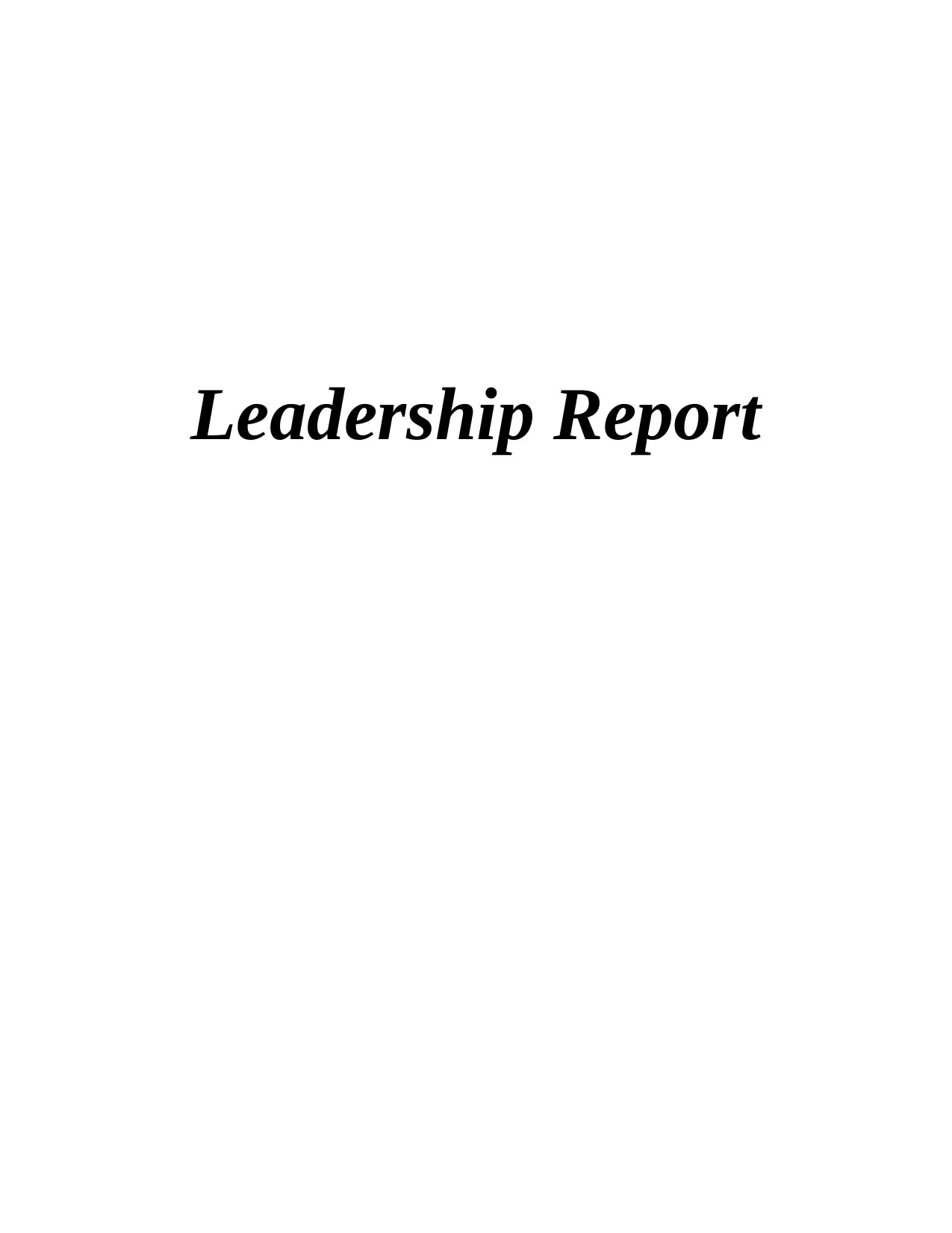
Leadership Report
Secure Best Marks with AI Grader
Need help grading? Try our AI Grader for instant feedback on your assignments.
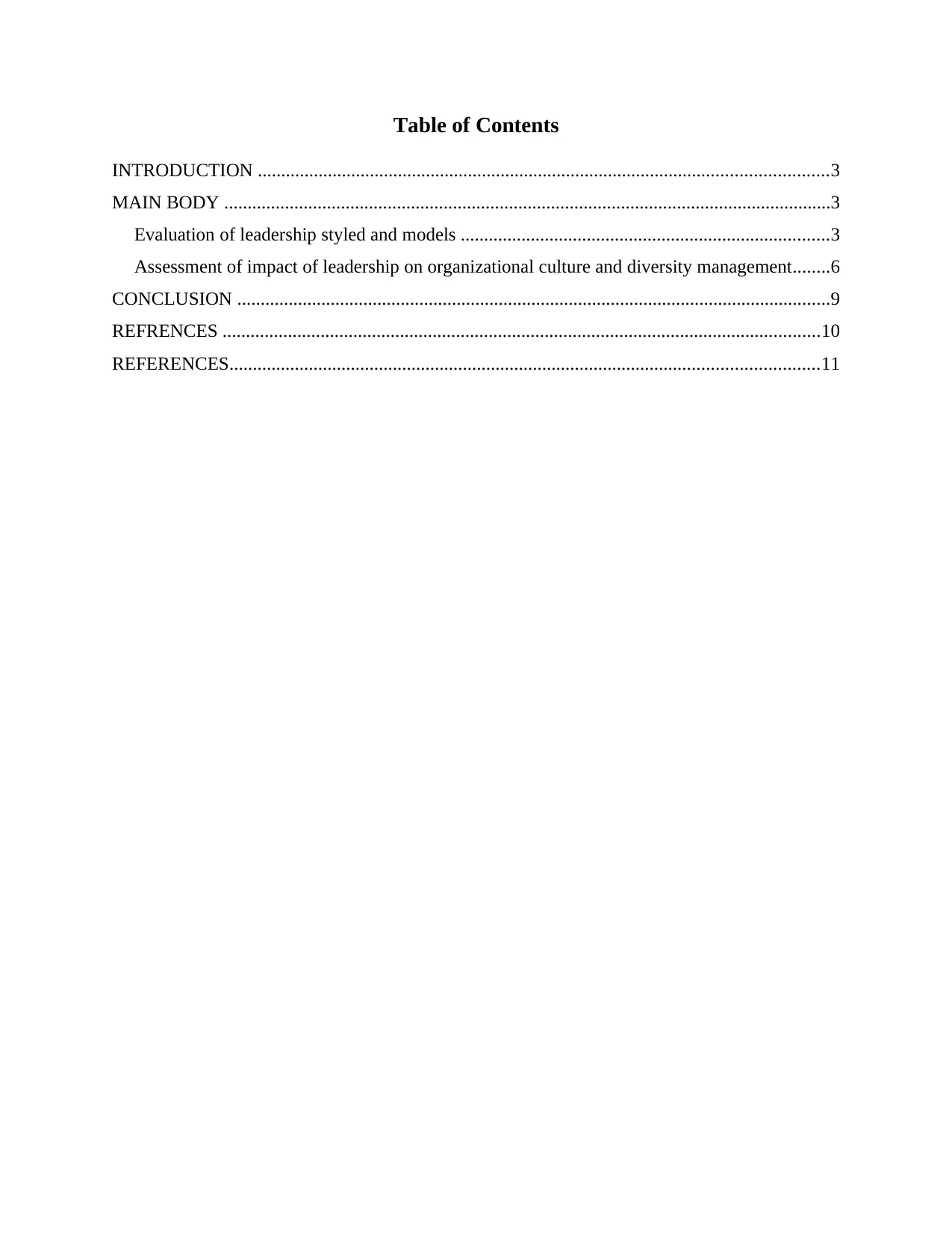
Table of Contents
INTRODUCTION ..........................................................................................................................3
MAIN BODY ..................................................................................................................................3
Evaluation of leadership styled and models ...............................................................................3
Assessment of impact of leadership on organizational culture and diversity management........6
CONCLUSION ...............................................................................................................................9
REFRENCES ................................................................................................................................10
REFERENCES..............................................................................................................................11
INTRODUCTION ..........................................................................................................................3
MAIN BODY ..................................................................................................................................3
Evaluation of leadership styled and models ...............................................................................3
Assessment of impact of leadership on organizational culture and diversity management........6
CONCLUSION ...............................................................................................................................9
REFRENCES ................................................................................................................................10
REFERENCES..............................................................................................................................11
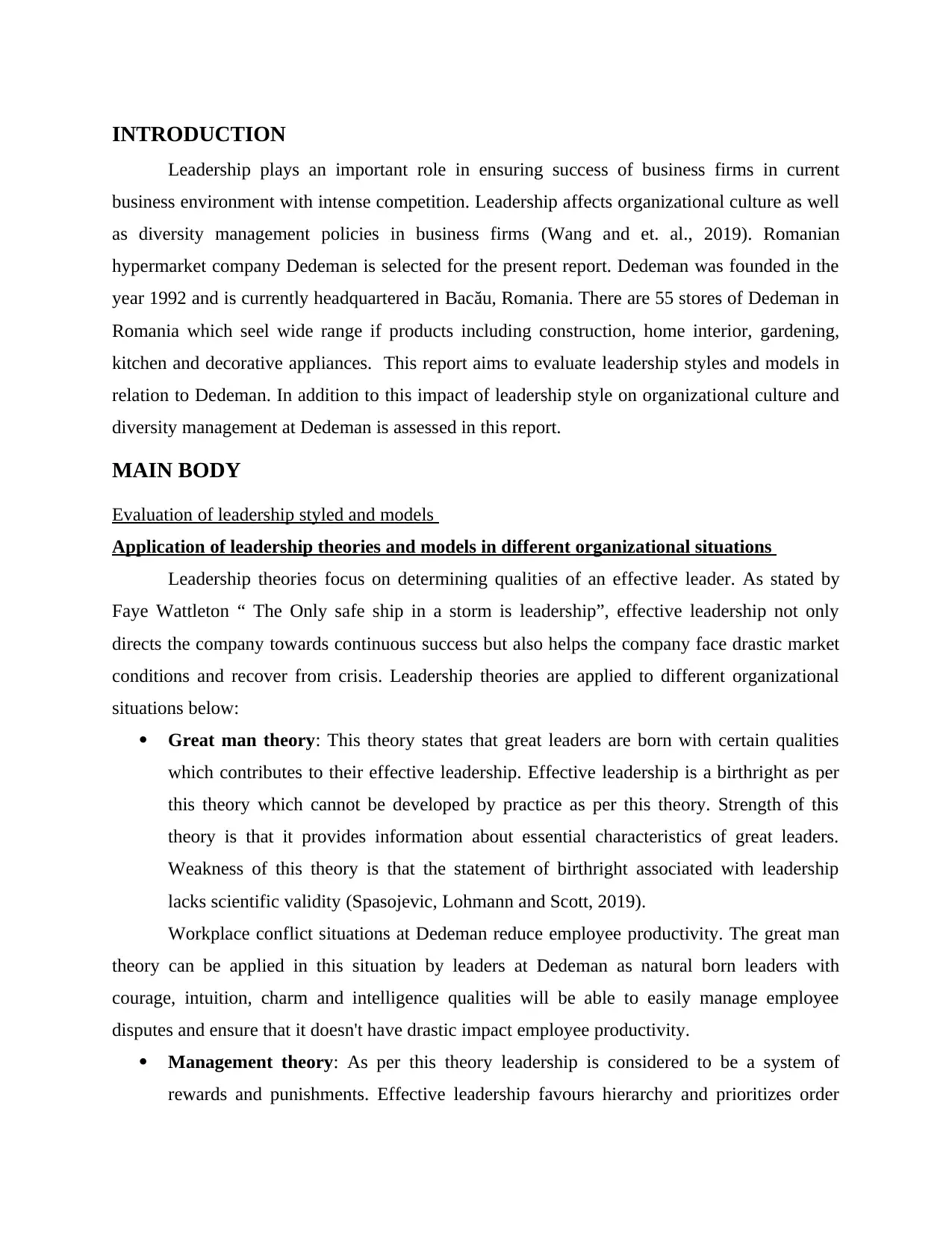
INTRODUCTION
Leadership plays an important role in ensuring success of business firms in current
business environment with intense competition. Leadership affects organizational culture as well
as diversity management policies in business firms (Wang and et. al., 2019). Romanian
hypermarket company Dedeman is selected for the present report. Dedeman was founded in the
year 1992 and is currently headquartered in Bacău, Romania. There are 55 stores of Dedeman in
Romania which seel wide range if products including construction, home interior, gardening,
kitchen and decorative appliances. This report aims to evaluate leadership styles and models in
relation to Dedeman. In addition to this impact of leadership style on organizational culture and
diversity management at Dedeman is assessed in this report.
MAIN BODY
Evaluation of leadership styled and models
Application of leadership theories and models in different organizational situations
Leadership theories focus on determining qualities of an effective leader. As stated by
Faye Wattleton “ The Only safe ship in a storm is leadership”, effective leadership not only
directs the company towards continuous success but also helps the company face drastic market
conditions and recover from crisis. Leadership theories are applied to different organizational
situations below:
Great man theory: This theory states that great leaders are born with certain qualities
which contributes to their effective leadership. Effective leadership is a birthright as per
this theory which cannot be developed by practice as per this theory. Strength of this
theory is that it provides information about essential characteristics of great leaders.
Weakness of this theory is that the statement of birthright associated with leadership
lacks scientific validity (Spasojevic, Lohmann and Scott, 2019).
Workplace conflict situations at Dedeman reduce employee productivity. The great man
theory can be applied in this situation by leaders at Dedeman as natural born leaders with
courage, intuition, charm and intelligence qualities will be able to easily manage employee
disputes and ensure that it doesn't have drastic impact employee productivity.
Management theory: As per this theory leadership is considered to be a system of
rewards and punishments. Effective leadership favours hierarchy and prioritizes order
Leadership plays an important role in ensuring success of business firms in current
business environment with intense competition. Leadership affects organizational culture as well
as diversity management policies in business firms (Wang and et. al., 2019). Romanian
hypermarket company Dedeman is selected for the present report. Dedeman was founded in the
year 1992 and is currently headquartered in Bacău, Romania. There are 55 stores of Dedeman in
Romania which seel wide range if products including construction, home interior, gardening,
kitchen and decorative appliances. This report aims to evaluate leadership styles and models in
relation to Dedeman. In addition to this impact of leadership style on organizational culture and
diversity management at Dedeman is assessed in this report.
MAIN BODY
Evaluation of leadership styled and models
Application of leadership theories and models in different organizational situations
Leadership theories focus on determining qualities of an effective leader. As stated by
Faye Wattleton “ The Only safe ship in a storm is leadership”, effective leadership not only
directs the company towards continuous success but also helps the company face drastic market
conditions and recover from crisis. Leadership theories are applied to different organizational
situations below:
Great man theory: This theory states that great leaders are born with certain qualities
which contributes to their effective leadership. Effective leadership is a birthright as per
this theory which cannot be developed by practice as per this theory. Strength of this
theory is that it provides information about essential characteristics of great leaders.
Weakness of this theory is that the statement of birthright associated with leadership
lacks scientific validity (Spasojevic, Lohmann and Scott, 2019).
Workplace conflict situations at Dedeman reduce employee productivity. The great man
theory can be applied in this situation by leaders at Dedeman as natural born leaders with
courage, intuition, charm and intelligence qualities will be able to easily manage employee
disputes and ensure that it doesn't have drastic impact employee productivity.
Management theory: As per this theory leadership is considered to be a system of
rewards and punishments. Effective leadership favours hierarchy and prioritizes order
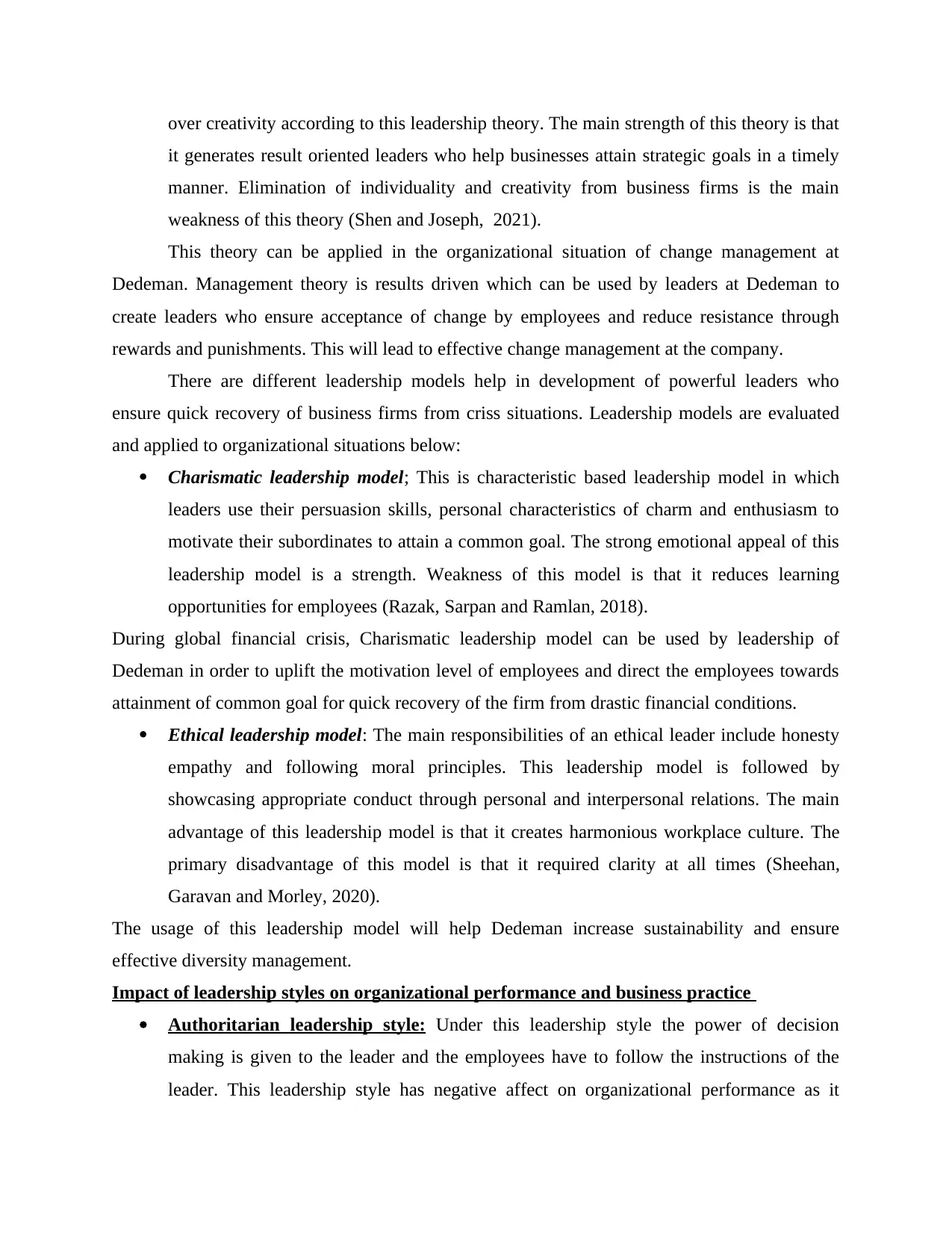
over creativity according to this leadership theory. The main strength of this theory is that
it generates result oriented leaders who help businesses attain strategic goals in a timely
manner. Elimination of individuality and creativity from business firms is the main
weakness of this theory (Shen and Joseph, 2021).
This theory can be applied in the organizational situation of change management at
Dedeman. Management theory is results driven which can be used by leaders at Dedeman to
create leaders who ensure acceptance of change by employees and reduce resistance through
rewards and punishments. This will lead to effective change management at the company.
There are different leadership models help in development of powerful leaders who
ensure quick recovery of business firms from criss situations. Leadership models are evaluated
and applied to organizational situations below:
Charismatic leadership model; This is characteristic based leadership model in which
leaders use their persuasion skills, personal characteristics of charm and enthusiasm to
motivate their subordinates to attain a common goal. The strong emotional appeal of this
leadership model is a strength. Weakness of this model is that it reduces learning
opportunities for employees (Razak, Sarpan and Ramlan, 2018).
During global financial crisis, Charismatic leadership model can be used by leadership of
Dedeman in order to uplift the motivation level of employees and direct the employees towards
attainment of common goal for quick recovery of the firm from drastic financial conditions.
Ethical leadership model: The main responsibilities of an ethical leader include honesty
empathy and following moral principles. This leadership model is followed by
showcasing appropriate conduct through personal and interpersonal relations. The main
advantage of this leadership model is that it creates harmonious workplace culture. The
primary disadvantage of this model is that it required clarity at all times (Sheehan,
Garavan and Morley, 2020).
The usage of this leadership model will help Dedeman increase sustainability and ensure
effective diversity management.
Impact of leadership styles on organizational performance and business practice
Authoritarian leadership style: Under this leadership style the power of decision
making is given to the leader and the employees have to follow the instructions of the
leader. This leadership style has negative affect on organizational performance as it
it generates result oriented leaders who help businesses attain strategic goals in a timely
manner. Elimination of individuality and creativity from business firms is the main
weakness of this theory (Shen and Joseph, 2021).
This theory can be applied in the organizational situation of change management at
Dedeman. Management theory is results driven which can be used by leaders at Dedeman to
create leaders who ensure acceptance of change by employees and reduce resistance through
rewards and punishments. This will lead to effective change management at the company.
There are different leadership models help in development of powerful leaders who
ensure quick recovery of business firms from criss situations. Leadership models are evaluated
and applied to organizational situations below:
Charismatic leadership model; This is characteristic based leadership model in which
leaders use their persuasion skills, personal characteristics of charm and enthusiasm to
motivate their subordinates to attain a common goal. The strong emotional appeal of this
leadership model is a strength. Weakness of this model is that it reduces learning
opportunities for employees (Razak, Sarpan and Ramlan, 2018).
During global financial crisis, Charismatic leadership model can be used by leadership of
Dedeman in order to uplift the motivation level of employees and direct the employees towards
attainment of common goal for quick recovery of the firm from drastic financial conditions.
Ethical leadership model: The main responsibilities of an ethical leader include honesty
empathy and following moral principles. This leadership model is followed by
showcasing appropriate conduct through personal and interpersonal relations. The main
advantage of this leadership model is that it creates harmonious workplace culture. The
primary disadvantage of this model is that it required clarity at all times (Sheehan,
Garavan and Morley, 2020).
The usage of this leadership model will help Dedeman increase sustainability and ensure
effective diversity management.
Impact of leadership styles on organizational performance and business practice
Authoritarian leadership style: Under this leadership style the power of decision
making is given to the leader and the employees have to follow the instructions of the
leader. This leadership style has negative affect on organizational performance as it
Secure Best Marks with AI Grader
Need help grading? Try our AI Grader for instant feedback on your assignments.
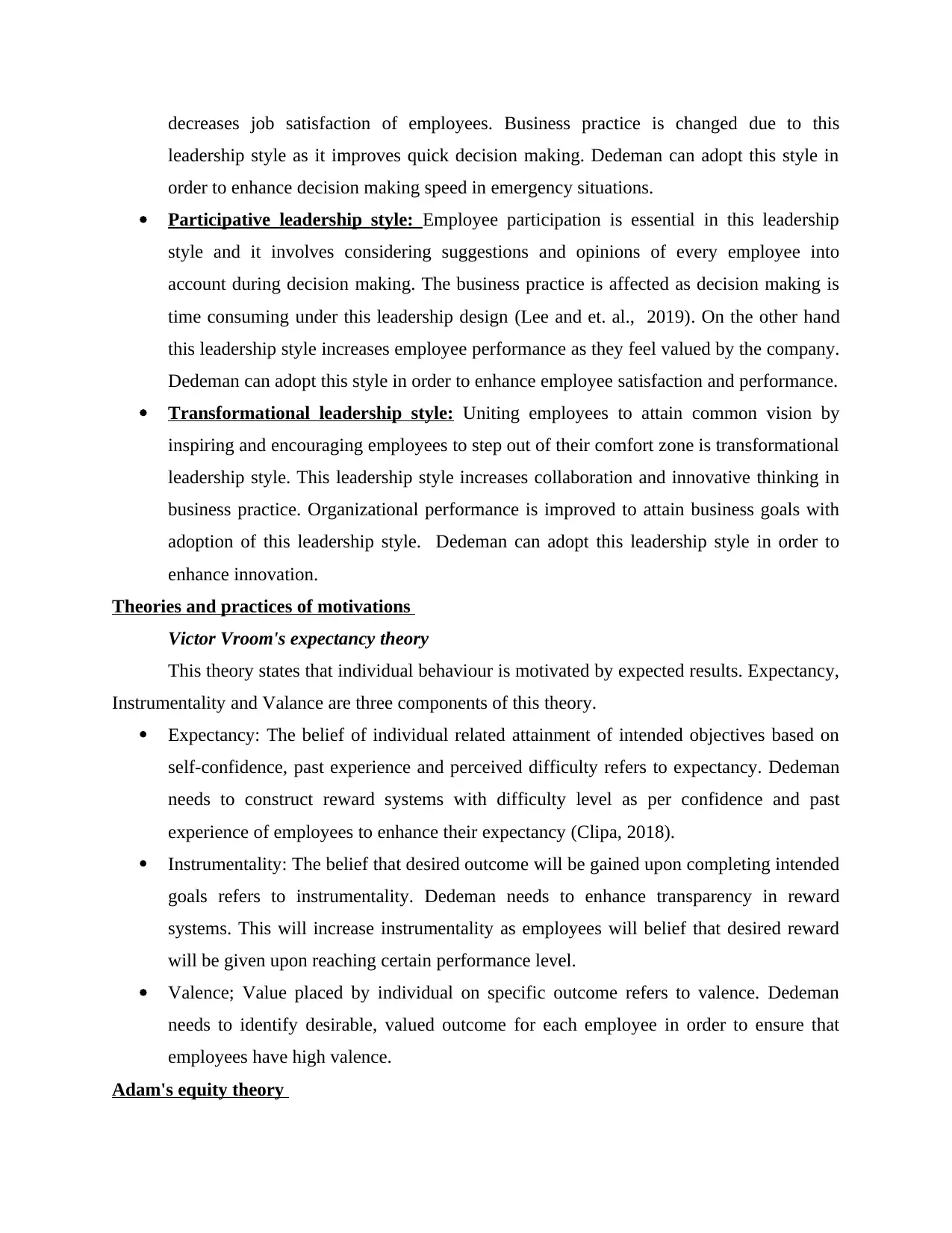
decreases job satisfaction of employees. Business practice is changed due to this
leadership style as it improves quick decision making. Dedeman can adopt this style in
order to enhance decision making speed in emergency situations.
Participative leadership style: Employee participation is essential in this leadership
style and it involves considering suggestions and opinions of every employee into
account during decision making. The business practice is affected as decision making is
time consuming under this leadership design (Lee and et. al., 2019). On the other hand
this leadership style increases employee performance as they feel valued by the company.
Dedeman can adopt this style in order to enhance employee satisfaction and performance.
Transformational leadership style: Uniting employees to attain common vision by
inspiring and encouraging employees to step out of their comfort zone is transformational
leadership style. This leadership style increases collaboration and innovative thinking in
business practice. Organizational performance is improved to attain business goals with
adoption of this leadership style. Dedeman can adopt this leadership style in order to
enhance innovation.
Theories and practices of motivations
Victor Vroom's expectancy theory
This theory states that individual behaviour is motivated by expected results. Expectancy,
Instrumentality and Valance are three components of this theory.
Expectancy: The belief of individual related attainment of intended objectives based on
self-confidence, past experience and perceived difficulty refers to expectancy. Dedeman
needs to construct reward systems with difficulty level as per confidence and past
experience of employees to enhance their expectancy (Clipa, 2018).
Instrumentality: The belief that desired outcome will be gained upon completing intended
goals refers to instrumentality. Dedeman needs to enhance transparency in reward
systems. This will increase instrumentality as employees will belief that desired reward
will be given upon reaching certain performance level.
Valence; Value placed by individual on specific outcome refers to valence. Dedeman
needs to identify desirable, valued outcome for each employee in order to ensure that
employees have high valence.
Adam's equity theory
leadership style as it improves quick decision making. Dedeman can adopt this style in
order to enhance decision making speed in emergency situations.
Participative leadership style: Employee participation is essential in this leadership
style and it involves considering suggestions and opinions of every employee into
account during decision making. The business practice is affected as decision making is
time consuming under this leadership design (Lee and et. al., 2019). On the other hand
this leadership style increases employee performance as they feel valued by the company.
Dedeman can adopt this style in order to enhance employee satisfaction and performance.
Transformational leadership style: Uniting employees to attain common vision by
inspiring and encouraging employees to step out of their comfort zone is transformational
leadership style. This leadership style increases collaboration and innovative thinking in
business practice. Organizational performance is improved to attain business goals with
adoption of this leadership style. Dedeman can adopt this leadership style in order to
enhance innovation.
Theories and practices of motivations
Victor Vroom's expectancy theory
This theory states that individual behaviour is motivated by expected results. Expectancy,
Instrumentality and Valance are three components of this theory.
Expectancy: The belief of individual related attainment of intended objectives based on
self-confidence, past experience and perceived difficulty refers to expectancy. Dedeman
needs to construct reward systems with difficulty level as per confidence and past
experience of employees to enhance their expectancy (Clipa, 2018).
Instrumentality: The belief that desired outcome will be gained upon completing intended
goals refers to instrumentality. Dedeman needs to enhance transparency in reward
systems. This will increase instrumentality as employees will belief that desired reward
will be given upon reaching certain performance level.
Valence; Value placed by individual on specific outcome refers to valence. Dedeman
needs to identify desirable, valued outcome for each employee in order to ensure that
employees have high valence.
Adam's equity theory
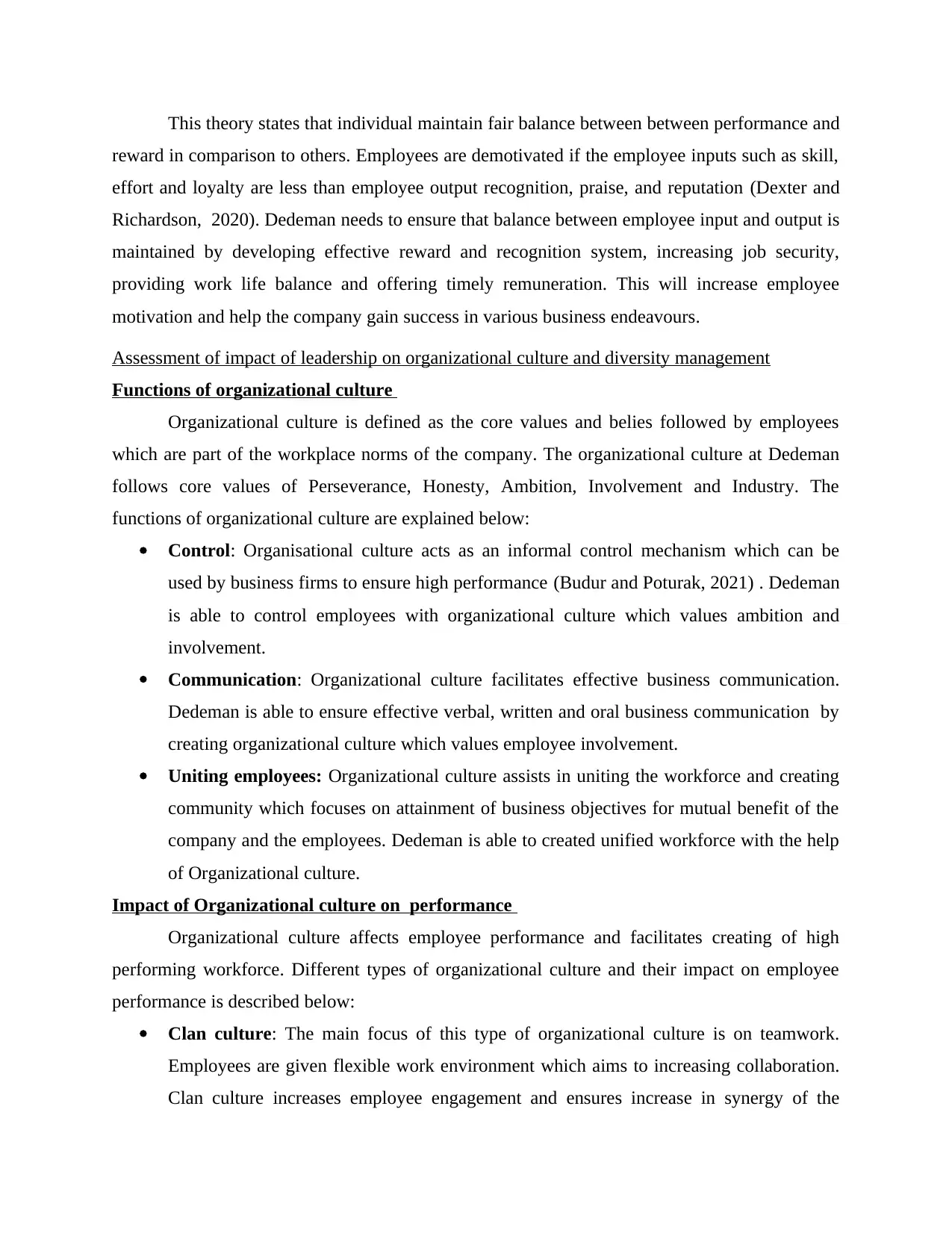
This theory states that individual maintain fair balance between between performance and
reward in comparison to others. Employees are demotivated if the employee inputs such as skill,
effort and loyalty are less than employee output recognition, praise, and reputation (Dexter and
Richardson, 2020). Dedeman needs to ensure that balance between employee input and output is
maintained by developing effective reward and recognition system, increasing job security,
providing work life balance and offering timely remuneration. This will increase employee
motivation and help the company gain success in various business endeavours.
Assessment of impact of leadership on organizational culture and diversity management
Functions of organizational culture
Organizational culture is defined as the core values and belies followed by employees
which are part of the workplace norms of the company. The organizational culture at Dedeman
follows core values of Perseverance, Honesty, Ambition, Involvement and Industry. The
functions of organizational culture are explained below:
Control: Organisational culture acts as an informal control mechanism which can be
used by business firms to ensure high performance (Budur and Poturak, 2021) . Dedeman
is able to control employees with organizational culture which values ambition and
involvement.
Communication: Organizational culture facilitates effective business communication.
Dedeman is able to ensure effective verbal, written and oral business communication by
creating organizational culture which values employee involvement.
Uniting employees: Organizational culture assists in uniting the workforce and creating
community which focuses on attainment of business objectives for mutual benefit of the
company and the employees. Dedeman is able to created unified workforce with the help
of Organizational culture.
Impact of Organizational culture on performance
Organizational culture affects employee performance and facilitates creating of high
performing workforce. Different types of organizational culture and their impact on employee
performance is described below:
Clan culture: The main focus of this type of organizational culture is on teamwork.
Employees are given flexible work environment which aims to increasing collaboration.
Clan culture increases employee engagement and ensures increase in synergy of the
reward in comparison to others. Employees are demotivated if the employee inputs such as skill,
effort and loyalty are less than employee output recognition, praise, and reputation (Dexter and
Richardson, 2020). Dedeman needs to ensure that balance between employee input and output is
maintained by developing effective reward and recognition system, increasing job security,
providing work life balance and offering timely remuneration. This will increase employee
motivation and help the company gain success in various business endeavours.
Assessment of impact of leadership on organizational culture and diversity management
Functions of organizational culture
Organizational culture is defined as the core values and belies followed by employees
which are part of the workplace norms of the company. The organizational culture at Dedeman
follows core values of Perseverance, Honesty, Ambition, Involvement and Industry. The
functions of organizational culture are explained below:
Control: Organisational culture acts as an informal control mechanism which can be
used by business firms to ensure high performance (Budur and Poturak, 2021) . Dedeman
is able to control employees with organizational culture which values ambition and
involvement.
Communication: Organizational culture facilitates effective business communication.
Dedeman is able to ensure effective verbal, written and oral business communication by
creating organizational culture which values employee involvement.
Uniting employees: Organizational culture assists in uniting the workforce and creating
community which focuses on attainment of business objectives for mutual benefit of the
company and the employees. Dedeman is able to created unified workforce with the help
of Organizational culture.
Impact of Organizational culture on performance
Organizational culture affects employee performance and facilitates creating of high
performing workforce. Different types of organizational culture and their impact on employee
performance is described below:
Clan culture: The main focus of this type of organizational culture is on teamwork.
Employees are given flexible work environment which aims to increasing collaboration.
Clan culture increases employee engagement and ensures increase in synergy of the
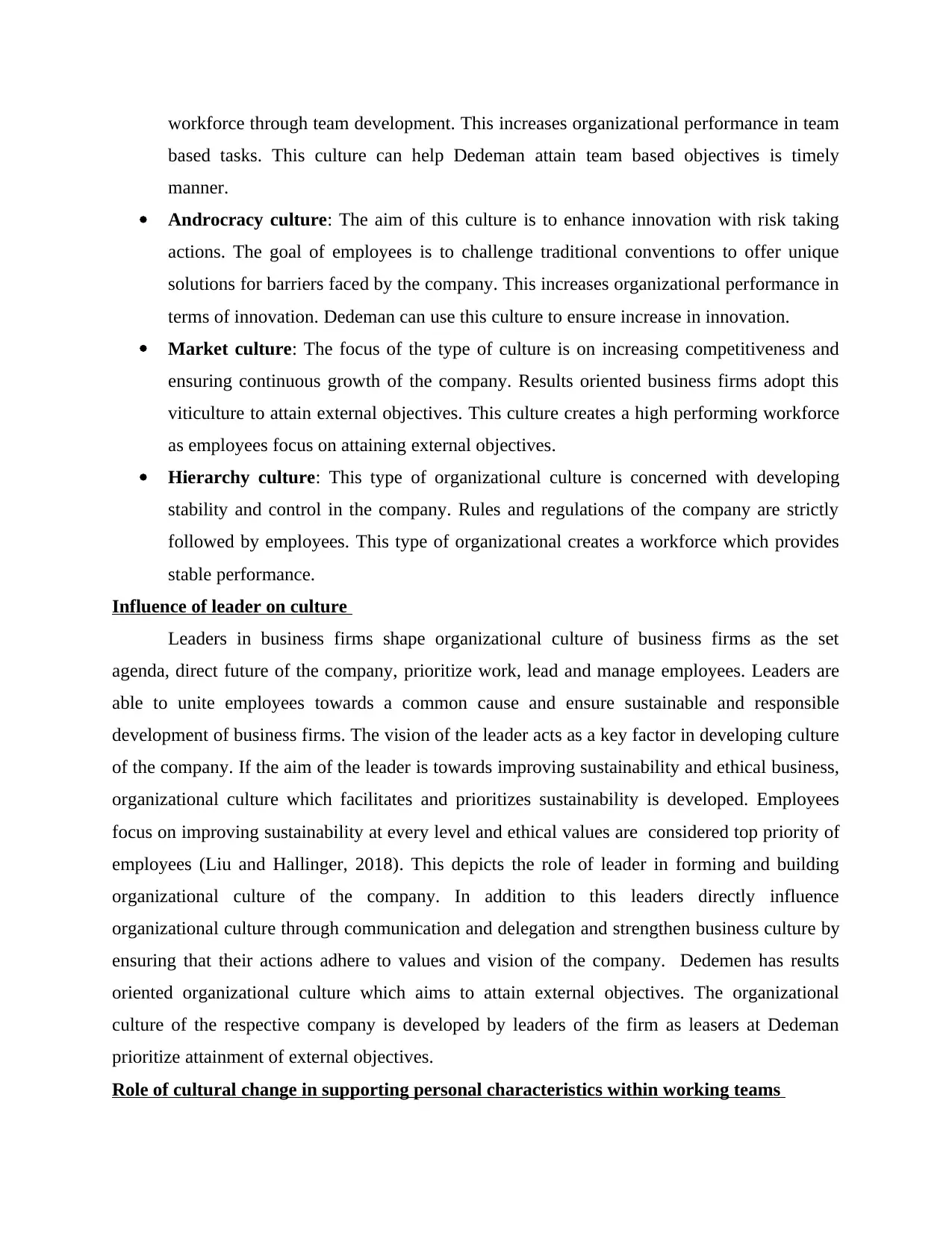
workforce through team development. This increases organizational performance in team
based tasks. This culture can help Dedeman attain team based objectives is timely
manner.
Androcracy culture: The aim of this culture is to enhance innovation with risk taking
actions. The goal of employees is to challenge traditional conventions to offer unique
solutions for barriers faced by the company. This increases organizational performance in
terms of innovation. Dedeman can use this culture to ensure increase in innovation.
Market culture: The focus of the type of culture is on increasing competitiveness and
ensuring continuous growth of the company. Results oriented business firms adopt this
viticulture to attain external objectives. This culture creates a high performing workforce
as employees focus on attaining external objectives.
Hierarchy culture: This type of organizational culture is concerned with developing
stability and control in the company. Rules and regulations of the company are strictly
followed by employees. This type of organizational creates a workforce which provides
stable performance.
Influence of leader on culture
Leaders in business firms shape organizational culture of business firms as the set
agenda, direct future of the company, prioritize work, lead and manage employees. Leaders are
able to unite employees towards a common cause and ensure sustainable and responsible
development of business firms. The vision of the leader acts as a key factor in developing culture
of the company. If the aim of the leader is towards improving sustainability and ethical business,
organizational culture which facilitates and prioritizes sustainability is developed. Employees
focus on improving sustainability at every level and ethical values are considered top priority of
employees (Liu and Hallinger, 2018). This depicts the role of leader in forming and building
organizational culture of the company. In addition to this leaders directly influence
organizational culture through communication and delegation and strengthen business culture by
ensuring that their actions adhere to values and vision of the company. Dedemen has results
oriented organizational culture which aims to attain external objectives. The organizational
culture of the respective company is developed by leaders of the firm as leasers at Dedeman
prioritize attainment of external objectives.
Role of cultural change in supporting personal characteristics within working teams
based tasks. This culture can help Dedeman attain team based objectives is timely
manner.
Androcracy culture: The aim of this culture is to enhance innovation with risk taking
actions. The goal of employees is to challenge traditional conventions to offer unique
solutions for barriers faced by the company. This increases organizational performance in
terms of innovation. Dedeman can use this culture to ensure increase in innovation.
Market culture: The focus of the type of culture is on increasing competitiveness and
ensuring continuous growth of the company. Results oriented business firms adopt this
viticulture to attain external objectives. This culture creates a high performing workforce
as employees focus on attaining external objectives.
Hierarchy culture: This type of organizational culture is concerned with developing
stability and control in the company. Rules and regulations of the company are strictly
followed by employees. This type of organizational creates a workforce which provides
stable performance.
Influence of leader on culture
Leaders in business firms shape organizational culture of business firms as the set
agenda, direct future of the company, prioritize work, lead and manage employees. Leaders are
able to unite employees towards a common cause and ensure sustainable and responsible
development of business firms. The vision of the leader acts as a key factor in developing culture
of the company. If the aim of the leader is towards improving sustainability and ethical business,
organizational culture which facilitates and prioritizes sustainability is developed. Employees
focus on improving sustainability at every level and ethical values are considered top priority of
employees (Liu and Hallinger, 2018). This depicts the role of leader in forming and building
organizational culture of the company. In addition to this leaders directly influence
organizational culture through communication and delegation and strengthen business culture by
ensuring that their actions adhere to values and vision of the company. Dedemen has results
oriented organizational culture which aims to attain external objectives. The organizational
culture of the respective company is developed by leaders of the firm as leasers at Dedeman
prioritize attainment of external objectives.
Role of cultural change in supporting personal characteristics within working teams
Paraphrase This Document
Need a fresh take? Get an instant paraphrase of this document with our AI Paraphraser
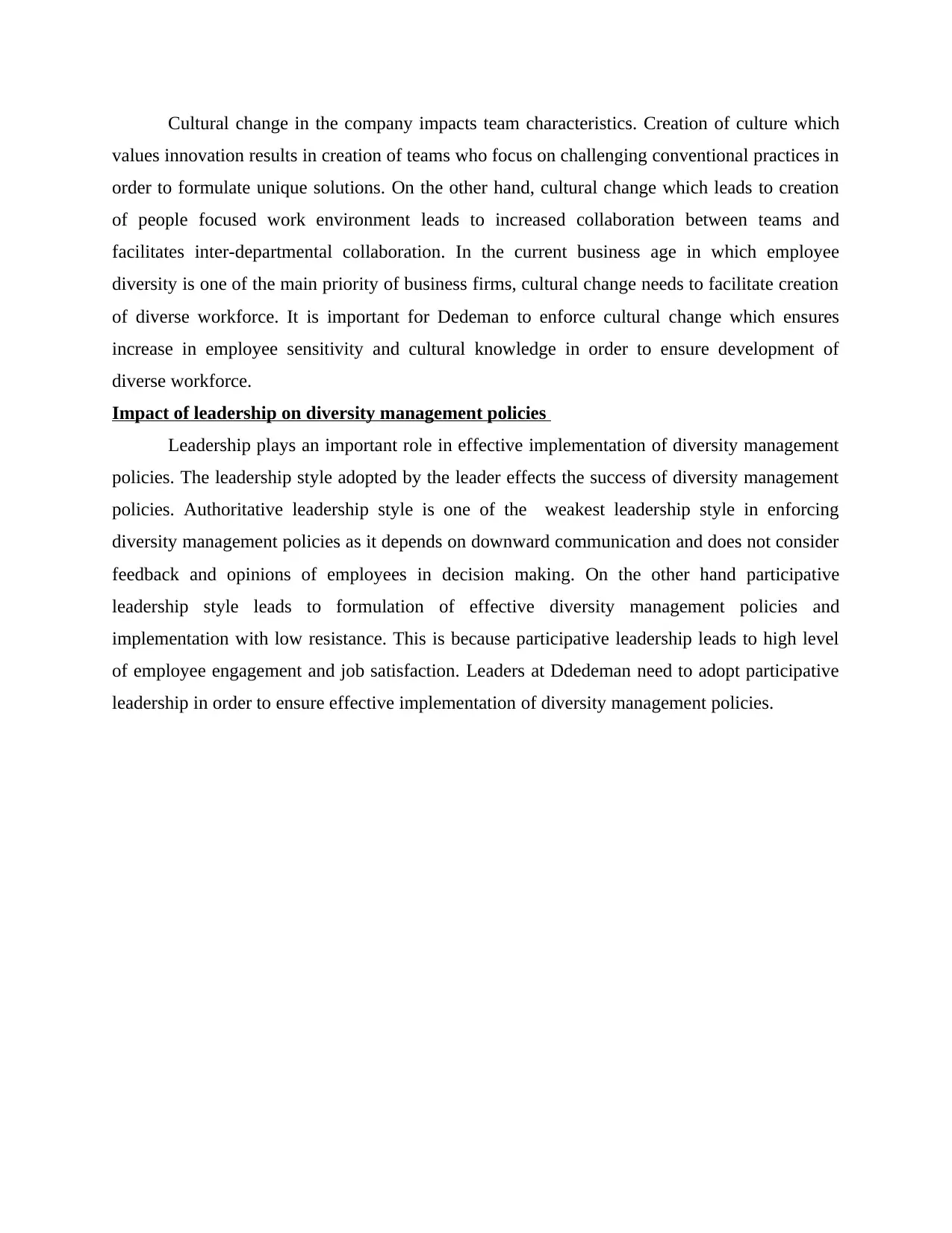
Cultural change in the company impacts team characteristics. Creation of culture which
values innovation results in creation of teams who focus on challenging conventional practices in
order to formulate unique solutions. On the other hand, cultural change which leads to creation
of people focused work environment leads to increased collaboration between teams and
facilitates inter-departmental collaboration. In the current business age in which employee
diversity is one of the main priority of business firms, cultural change needs to facilitate creation
of diverse workforce. It is important for Dedeman to enforce cultural change which ensures
increase in employee sensitivity and cultural knowledge in order to ensure development of
diverse workforce.
Impact of leadership on diversity management policies
Leadership plays an important role in effective implementation of diversity management
policies. The leadership style adopted by the leader effects the success of diversity management
policies. Authoritative leadership style is one of the weakest leadership style in enforcing
diversity management policies as it depends on downward communication and does not consider
feedback and opinions of employees in decision making. On the other hand participative
leadership style leads to formulation of effective diversity management policies and
implementation with low resistance. This is because participative leadership leads to high level
of employee engagement and job satisfaction. Leaders at Ddedeman need to adopt participative
leadership in order to ensure effective implementation of diversity management policies.
values innovation results in creation of teams who focus on challenging conventional practices in
order to formulate unique solutions. On the other hand, cultural change which leads to creation
of people focused work environment leads to increased collaboration between teams and
facilitates inter-departmental collaboration. In the current business age in which employee
diversity is one of the main priority of business firms, cultural change needs to facilitate creation
of diverse workforce. It is important for Dedeman to enforce cultural change which ensures
increase in employee sensitivity and cultural knowledge in order to ensure development of
diverse workforce.
Impact of leadership on diversity management policies
Leadership plays an important role in effective implementation of diversity management
policies. The leadership style adopted by the leader effects the success of diversity management
policies. Authoritative leadership style is one of the weakest leadership style in enforcing
diversity management policies as it depends on downward communication and does not consider
feedback and opinions of employees in decision making. On the other hand participative
leadership style leads to formulation of effective diversity management policies and
implementation with low resistance. This is because participative leadership leads to high level
of employee engagement and job satisfaction. Leaders at Ddedeman need to adopt participative
leadership in order to ensure effective implementation of diversity management policies.
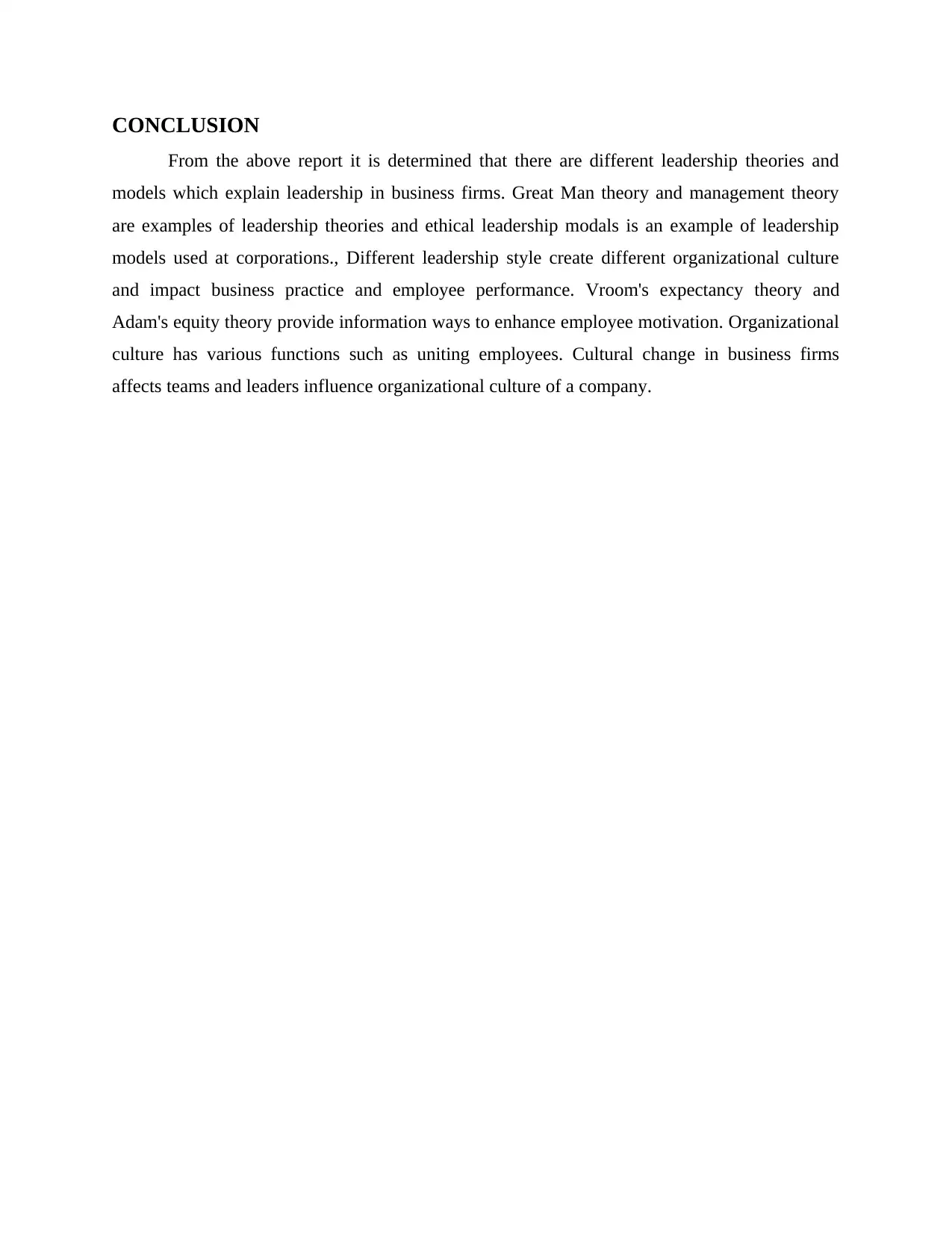
CONCLUSION
From the above report it is determined that there are different leadership theories and
models which explain leadership in business firms. Great Man theory and management theory
are examples of leadership theories and ethical leadership modals is an example of leadership
models used at corporations., Different leadership style create different organizational culture
and impact business practice and employee performance. Vroom's expectancy theory and
Adam's equity theory provide information ways to enhance employee motivation. Organizational
culture has various functions such as uniting employees. Cultural change in business firms
affects teams and leaders influence organizational culture of a company.
From the above report it is determined that there are different leadership theories and
models which explain leadership in business firms. Great Man theory and management theory
are examples of leadership theories and ethical leadership modals is an example of leadership
models used at corporations., Different leadership style create different organizational culture
and impact business practice and employee performance. Vroom's expectancy theory and
Adam's equity theory provide information ways to enhance employee motivation. Organizational
culture has various functions such as uniting employees. Cultural change in business firms
affects teams and leaders influence organizational culture of a company.
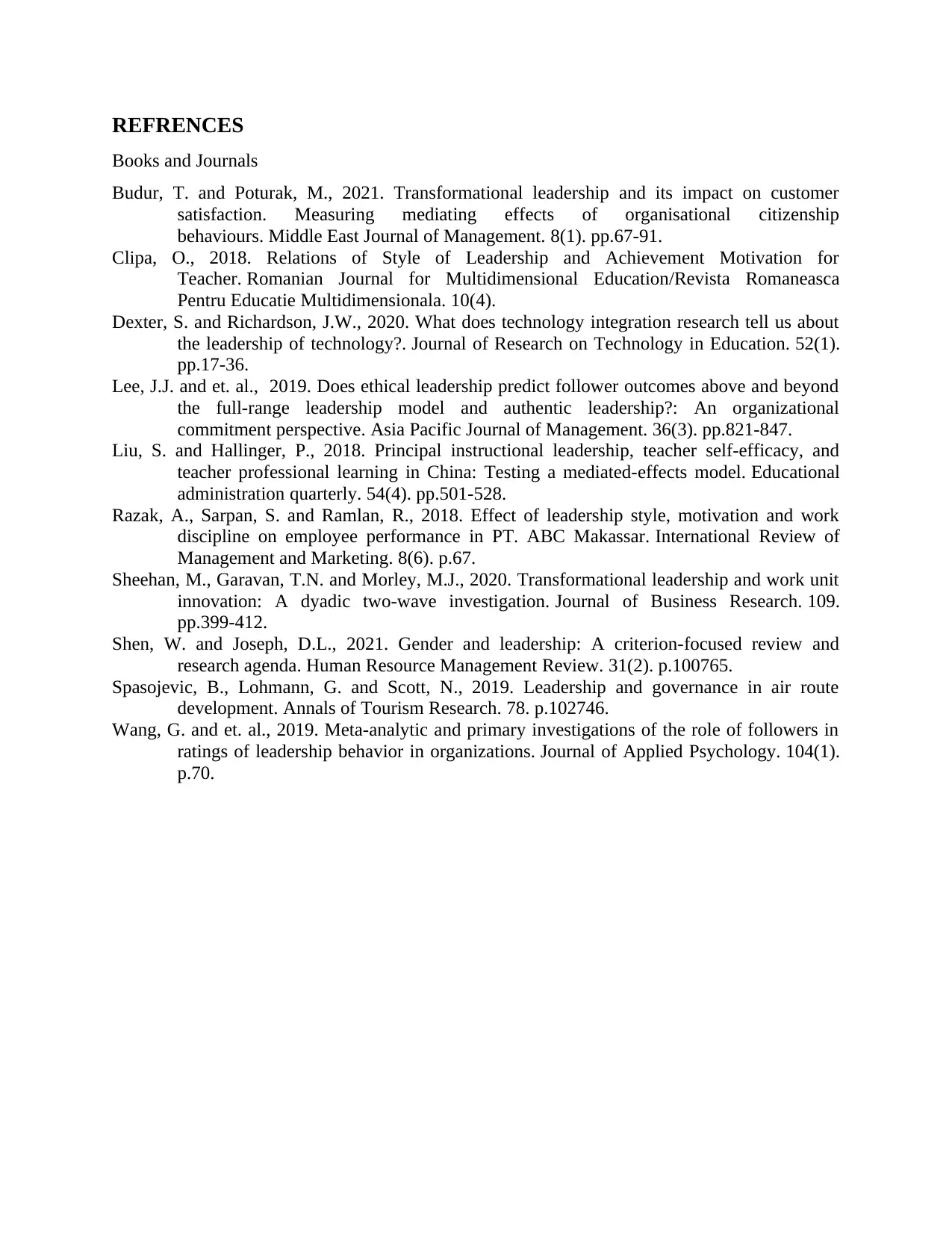
REFRENCES
Books and Journals
Budur, T. and Poturak, M., 2021. Transformational leadership and its impact on customer
satisfaction. Measuring mediating effects of organisational citizenship
behaviours. Middle East Journal of Management. 8(1). pp.67-91.
Clipa, O., 2018. Relations of Style of Leadership and Achievement Motivation for
Teacher. Romanian Journal for Multidimensional Education/Revista Romaneasca
Pentru Educatie Multidimensionala. 10(4).
Dexter, S. and Richardson, J.W., 2020. What does technology integration research tell us about
the leadership of technology?. Journal of Research on Technology in Education. 52(1).
pp.17-36.
Lee, J.J. and et. al., 2019. Does ethical leadership predict follower outcomes above and beyond
the full-range leadership model and authentic leadership?: An organizational
commitment perspective. Asia Pacific Journal of Management. 36(3). pp.821-847.
Liu, S. and Hallinger, P., 2018. Principal instructional leadership, teacher self-efficacy, and
teacher professional learning in China: Testing a mediated-effects model. Educational
administration quarterly. 54(4). pp.501-528.
Razak, A., Sarpan, S. and Ramlan, R., 2018. Effect of leadership style, motivation and work
discipline on employee performance in PT. ABC Makassar. International Review of
Management and Marketing. 8(6). p.67.
Sheehan, M., Garavan, T.N. and Morley, M.J., 2020. Transformational leadership and work unit
innovation: A dyadic two-wave investigation. Journal of Business Research. 109.
pp.399-412.
Shen, W. and Joseph, D.L., 2021. Gender and leadership: A criterion-focused review and
research agenda. Human Resource Management Review. 31(2). p.100765.
Spasojevic, B., Lohmann, G. and Scott, N., 2019. Leadership and governance in air route
development. Annals of Tourism Research. 78. p.102746.
Wang, G. and et. al., 2019. Meta-analytic and primary investigations of the role of followers in
ratings of leadership behavior in organizations. Journal of Applied Psychology. 104(1).
p.70.
Books and Journals
Budur, T. and Poturak, M., 2021. Transformational leadership and its impact on customer
satisfaction. Measuring mediating effects of organisational citizenship
behaviours. Middle East Journal of Management. 8(1). pp.67-91.
Clipa, O., 2018. Relations of Style of Leadership and Achievement Motivation for
Teacher. Romanian Journal for Multidimensional Education/Revista Romaneasca
Pentru Educatie Multidimensionala. 10(4).
Dexter, S. and Richardson, J.W., 2020. What does technology integration research tell us about
the leadership of technology?. Journal of Research on Technology in Education. 52(1).
pp.17-36.
Lee, J.J. and et. al., 2019. Does ethical leadership predict follower outcomes above and beyond
the full-range leadership model and authentic leadership?: An organizational
commitment perspective. Asia Pacific Journal of Management. 36(3). pp.821-847.
Liu, S. and Hallinger, P., 2018. Principal instructional leadership, teacher self-efficacy, and
teacher professional learning in China: Testing a mediated-effects model. Educational
administration quarterly. 54(4). pp.501-528.
Razak, A., Sarpan, S. and Ramlan, R., 2018. Effect of leadership style, motivation and work
discipline on employee performance in PT. ABC Makassar. International Review of
Management and Marketing. 8(6). p.67.
Sheehan, M., Garavan, T.N. and Morley, M.J., 2020. Transformational leadership and work unit
innovation: A dyadic two-wave investigation. Journal of Business Research. 109.
pp.399-412.
Shen, W. and Joseph, D.L., 2021. Gender and leadership: A criterion-focused review and
research agenda. Human Resource Management Review. 31(2). p.100765.
Spasojevic, B., Lohmann, G. and Scott, N., 2019. Leadership and governance in air route
development. Annals of Tourism Research. 78. p.102746.
Wang, G. and et. al., 2019. Meta-analytic and primary investigations of the role of followers in
ratings of leadership behavior in organizations. Journal of Applied Psychology. 104(1).
p.70.
Secure Best Marks with AI Grader
Need help grading? Try our AI Grader for instant feedback on your assignments.
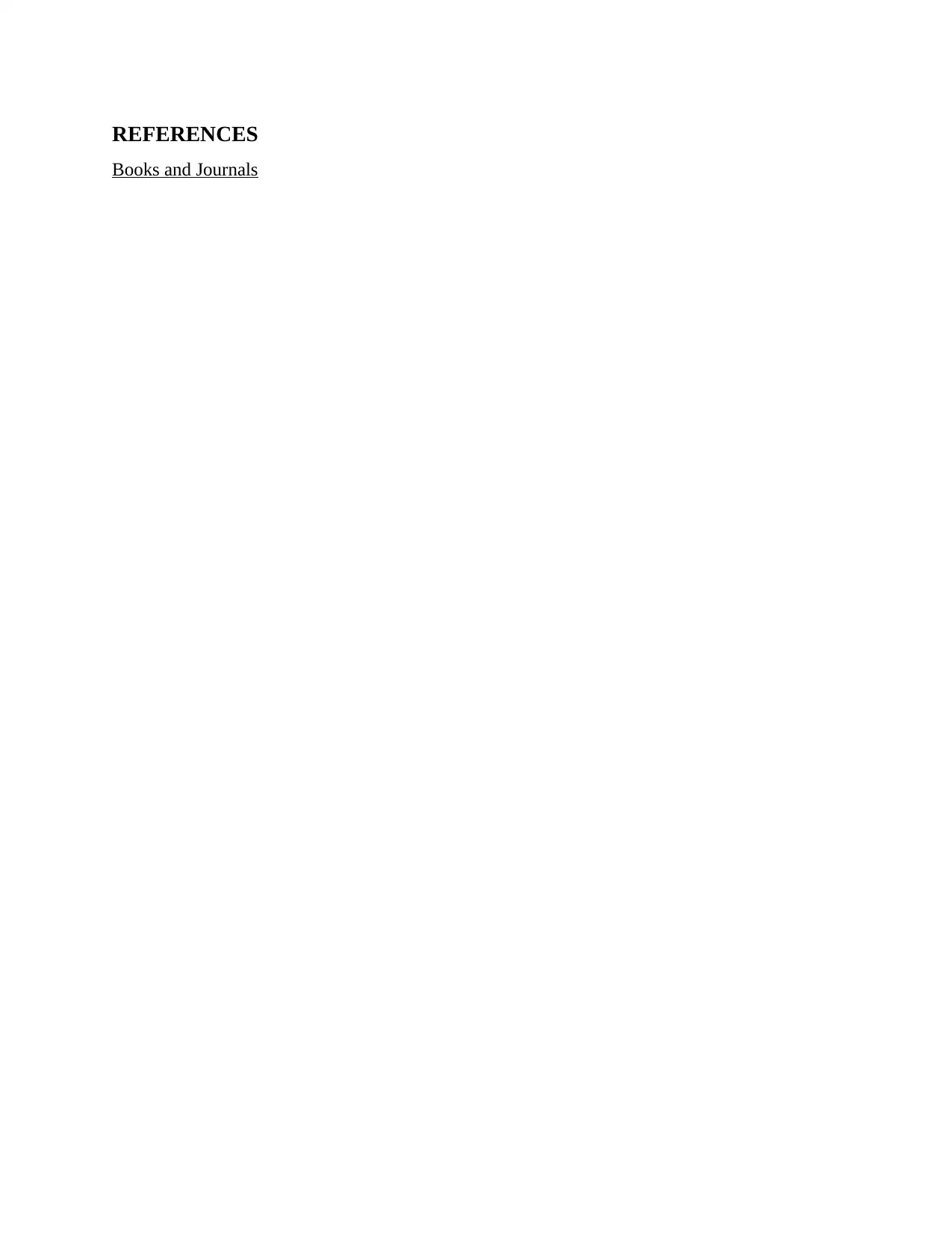
REFERENCES
Books and Journals
Books and Journals
1 out of 11
Related Documents
Your All-in-One AI-Powered Toolkit for Academic Success.
+13062052269
info@desklib.com
Available 24*7 on WhatsApp / Email
![[object Object]](/_next/static/media/star-bottom.7253800d.svg)
Unlock your academic potential
© 2024 | Zucol Services PVT LTD | All rights reserved.




